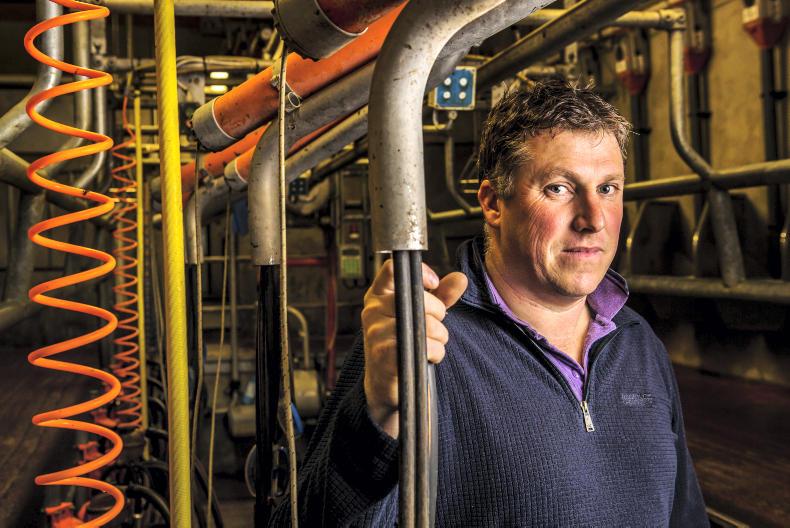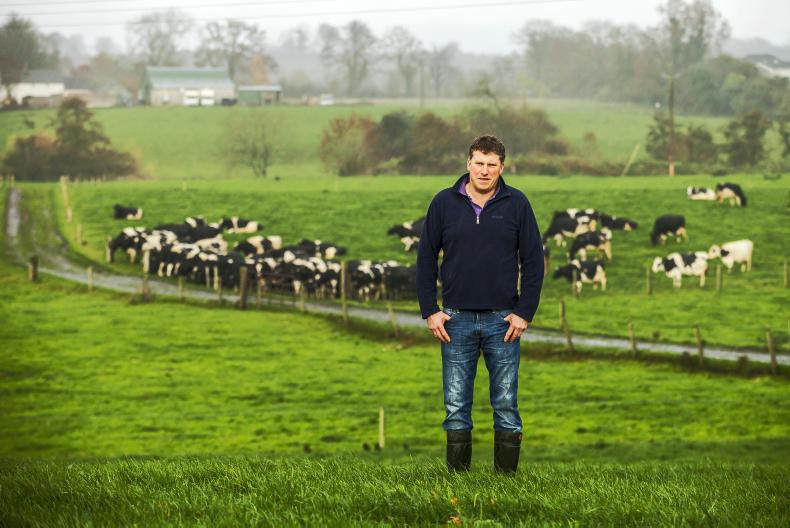So far we have followed 541, a replacement dairy heifer, from the calving shed to the calf shed and into the field. The last time we checked in she was at grass, drinking three litres of milk replacer and eating meal ad lib. At 78kg, she was coming up towards her weaning weight of 100kg.
She has since reached and surpassed 100kg, now completely weaned off milk.
“Over a period of seven days we reduce the volume of milk,” explains dairy farmer Jamie Kealy.

Jamie Kealy.
“After those seven days milk is totally removed from the diet. This way it doesn’t have much of an effect on the calves, they’ve sort of gotten used to it, so there’s no big shock to their system.
“You’d be looking for stress on the calf during the weaning period and after the weaning period. Stress can bring on pneumonia. By weaning gently you’d be hoping to avoid all that, if you were just to go straight away one day and pull the milk, that’s when you could see stress and that’s when you could see things like pneumonia.”
Grazing
Now 541 is eating a diet of 1.5kg of meal and good-quality grass. Jamie is using a leader-follower grazing system, which he says is working very well for calf growth.
“We’re not forcing the calves to eat all the grass, we’re giving them preferential grass and the maiden heifers are coming behind to clean up after them.
“It’s a little bit more work on us, that we’re moving strip wires more regularly and that, but you’re getting better growth rates from the calves by giving them preferential grass. In a way, you’re not making them do the work.”
Dosing
Prior to weaning, all calves were dosed for worms. The purpose of this was to take away any unnecessary stress, as worms put pressure on the lungs. They were also dosed with Bovicox to prevent coccidiosis.
“A lot of people don’t realise that calves can pick up coccidiosis,” says Jamie. “They actually have it before you see any symptoms of it. It lives in the soil from one year to the next, so we would have done that quite early just as a preventive measure, rather than a cure. When you actually see that they have it, it’s nearly too late and it really sets the calves back.” CL
The diary of calf 541 is an ongoing monthly series in Irish Country Living where we follow a replacement dairy heifer calf’s development for the first eight months of life.
Calf number: 541
EBI: €212
EBI sub index for milk: 71
EBI sub index for fertility: 80
Read more
The diary of calf 541: weeks four to eight
The diary of calf 541: weeks one to four
So far we have followed 541, a replacement dairy heifer, from the calving shed to the calf shed and into the field. The last time we checked in she was at grass, drinking three litres of milk replacer and eating meal ad lib. At 78kg, she was coming up towards her weaning weight of 100kg.
She has since reached and surpassed 100kg, now completely weaned off milk.
“Over a period of seven days we reduce the volume of milk,” explains dairy farmer Jamie Kealy.

Jamie Kealy.
“After those seven days milk is totally removed from the diet. This way it doesn’t have much of an effect on the calves, they’ve sort of gotten used to it, so there’s no big shock to their system.
“You’d be looking for stress on the calf during the weaning period and after the weaning period. Stress can bring on pneumonia. By weaning gently you’d be hoping to avoid all that, if you were just to go straight away one day and pull the milk, that’s when you could see stress and that’s when you could see things like pneumonia.”
Grazing
Now 541 is eating a diet of 1.5kg of meal and good-quality grass. Jamie is using a leader-follower grazing system, which he says is working very well for calf growth.
“We’re not forcing the calves to eat all the grass, we’re giving them preferential grass and the maiden heifers are coming behind to clean up after them.
“It’s a little bit more work on us, that we’re moving strip wires more regularly and that, but you’re getting better growth rates from the calves by giving them preferential grass. In a way, you’re not making them do the work.”
Dosing
Prior to weaning, all calves were dosed for worms. The purpose of this was to take away any unnecessary stress, as worms put pressure on the lungs. They were also dosed with Bovicox to prevent coccidiosis.
“A lot of people don’t realise that calves can pick up coccidiosis,” says Jamie. “They actually have it before you see any symptoms of it. It lives in the soil from one year to the next, so we would have done that quite early just as a preventive measure, rather than a cure. When you actually see that they have it, it’s nearly too late and it really sets the calves back.” CL
The diary of calf 541 is an ongoing monthly series in Irish Country Living where we follow a replacement dairy heifer calf’s development for the first eight months of life.
Calf number: 541
EBI: €212
EBI sub index for milk: 71
EBI sub index for fertility: 80
Read more
The diary of calf 541: weeks four to eight
The diary of calf 541: weeks one to four







 This is a subscriber-only article
This is a subscriber-only article










SHARING OPTIONS: